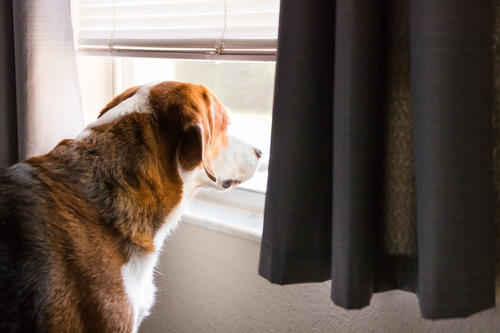Separation Anxiety in Dogs
Separation anxiety in dogs can be challenging for both pets and their owners. Dogs experiencing separation anxiety often exhibit stress and destructive behaviors when left alone, which can strain the bond between you and your beloved pet. This blog will dive into the causes, symptoms, and potential solutions for separation anxiety in dogs, helping you understand and address this common issue. For further assistance, please contact Acton Animal Hospital at 978-263-7477.

Understanding Separation Anxiety in Dogs
Separation anxiety in dogs occurs when a dog becomes excessively anxious when separated from their owner or primary caregiver. This condition can lead to various behaviors, including barking, chewing, and attempting to escape. Understanding the root causes and signs of separation anxiety in dogs is the first step toward helping your pet feel more comfortable and secure.
What Causes Separation Anxiety
Several factors can contribute to separation anxiety in dogs. Common causes include changes in the family structure, such as the addition of a new pet or a family member leaving. Dogs that have been rehomed or have experienced traumatic events are also more prone to developing separation anxiety. Additionally, certain breeds may be more predisposed to this condition due to their genetic makeup and temperament.
Signs and Symptoms of Separation Anxiety
Recognizing the signs of separation anxiety in dogs is crucial for early intervention. Common symptoms include:
- Excessive barking or howling
- Destructive behavior like chewing on furniture or digging
- Attempts to escape from the home
- Pacing
- Drooling
- Self-harm
If you notice these behaviors in your dog when you are away, they may be suffering from separation anxiety.
Managing Separation Anxiety in Dogs
Addressing separation anxiety in dogs requires a multi-faceted approach. While every dog is different, there are several strategies you can implement to help alleviate your dog’s anxiety and improve their overall well-being.
Establishing a Routine
Dogs thrive on routine and predictability. Establishing a consistent daily routine can help reduce anxiety by providing your dog with a sense of stability. Feed your dog, take them for walks, and engage in playtime at the same times each day. Consistency can help your dog feel more secure and reduce their anxiety levels.
Gradual Desensitization
Gradual desensitization involves slowly acclimating your dog to being alone for short periods and gradually increasing the duration over time. Start by leaving your dog alone for a few minutes and gradually extend the time as your dog becomes more comfortable. This process helps your dog learn that being alone is safe and temporary.
Creating a Safe Space
Creating a designated safe space for your dog can provide comfort and security when you are away. This space can be a crate, a specific room, or a cozy corner with your dog’s favorite toys and bedding. Ensure this area is quiet and free from stressors that could exacerbate your dog’s anxiety.
Using Calming Aids
Several products on the market can help reduce anxiety in dogs. Calming aids such as pheromone diffusers, anxiety wraps, and soothing music can create a calming environment for your dog. These aids can be particularly useful during the desensitization process and on days when you need to be away for longer periods.
When to Seek Professional Help
In some cases, separation anxiety in dogs may require professional intervention. If your dog’s anxiety is severe or persists despite your efforts, it may be time to seek help from a veterinarian or a professional dog trainer.
Veterinary Consultation
A veterinary consultation can help rule out any underlying medical issues that may be contributing to your dog’s anxiety. Your veterinarian can also provide guidance on behavior modification techniques and recommend appropriate medications if necessary.
Professional Dog Training
Professional dog trainers specialize in behavior modification and can work with you and your dog to address separation anxiety. They can provide customized training plans and support to help your dog develop coping mechanisms and reduce anxiety.
Supporting Your Dog’s Emotional Well-Being
For more information or to schedule a consultation, please call Acton Animal Hospital at 978-263-7477. Our team is here to support you and your pet through every step of the process. Understanding and managing separation anxiety in dogs is crucial for ensuring your pet’s well-being and happiness. By implementing these strategies and seeking professional help when needed, you can help your dog overcome their anxiety and enjoy a more relaxed and fulfilling life.
Recent Posts
About Us
Our veterinarians in Acton, MA bring over 80 years of combined experience and a multitude of services for your pet.
